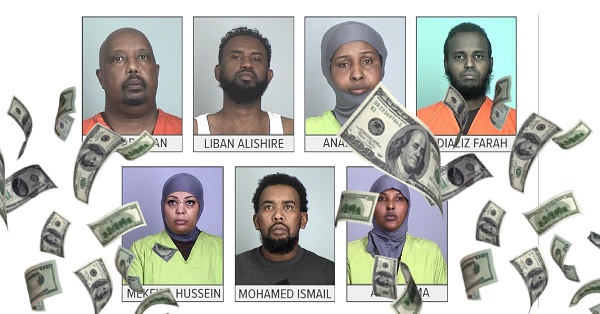Business
Ottawa once again defends egregious mismanagement during COVID

From the Fraser Institute
By: Jake Fuss and Tegan Hill
Two federal cabinet ministers criticized the report because it “fails to properly acknowledge that CEBA was designed and delivered during a global pandemic.” Translation—taxpayer money can be mismanaged so long as it’s delivered quickly, and we can use an emergency as an excuse for wasteful spending
According to a new report by Canada’s auditor general, in another of example of mismanagement and waste during the COVID pandemic, nearly 10 per cent—or $3.5 billion—of the federal government’s Canada Emergency Business Account (CEBA) loans went to ineligible businesses.
The report said “the program was not managed with due regard for value for money” and the government “did not effectively oversee the CEBA program.”
In response, two federal cabinet ministers criticized the report because it “fails to properly acknowledge that CEBA was designed and delivered during a global pandemic.”
Translation—taxpayer money can be mismanaged so long as it’s delivered quickly, and we can use an emergency as an excuse for wasteful spending. Accountability to the public is evidently an afterthought.
Of course, this is only the latest revelation of Trudeau government mismanagement during COVID. The government spent huge sums of taxpayer money on expensive programs such as the Canada Emergency Wage Subsidy (CEWS) and Canada Emergency Response Benefit (CERB). But a substantial share of this spending was simply wasted.
For example, an earlier report in 2022 by the auditor general found that ineligible individuals received $4.6 billion in CERB payments and other benefits. Ineligible recipients included 1,522 prisoners, 391 dead people and 434 children too young to be eligible. And 51,049 employers incorrectly received $9.9 billion in wage subsidies even though they did not have a sufficient drop in revenue to be eligible for the subsidies.
The federal government also spent billions on Canadians who probably didn’t need the money. An analysis published in 2020 by the Fraser Institute estimated that $11.8 billion in CERB payments went to eligible young people (ages 15 to 24) living with their parents in households with at least $100,000 in income. And an estimated $7.0 billion in CERB payments went to spouses in families with at least $100,000 in household income.
COVID-related programs were not only poorly targeted, but many payments surpassed the level required to restore the regular income of many recipients. According to the auditor general, the lowest-income Canada Recovery Benefit (CRB) recipients could take in more money from government benefits than from working, and the program “represented a disincentive to work, which impacted some labour markets at a crucial time when the need for employees was trending upwards.”
The total costs of fiscal waste during COVID are difficult to nail down. But our 2023 study estimated that one in four dollars of federal pandemic spending was wasted. That amounts to at least $89.9 billion in total fiscal waste. For context, that’s roughly what the British Columbia government spends annually in its entire budget for health care, education, social services, infrastructure, etc.
Finally, because the Trudeau government borrowed money to finance its excessive and wasteful COVID spending, Canadians will pay an estimated $21.1 billion in debt interest costs (over a 10-year period) that are directly attributable to this fiscal waste.
The new report by the auditor general is the latest proof of mismanagement by Ottawa during COVID, to the tune of billions of dollars in waste. Unfortunately, the government continues to scoff at the bill it’s handed to taxpayers for the waste it produced.
Business
Largest fraud in US history? Independent Journalist visits numerous daycare centres with no children, revealing massive scam

A young journalist has uncovered perhaps the largest fraud scheme in US history.
He certainly isn’t a polished reporter with many years of experience, but 23 year old independent journalist Nick Shirley seems to be getting the job done. Shirley has released an incredible video which appears to outline fraud after fraud after fraud in what appears to be a massive taxpayer funded scheme involving up to $9 Billion Dollars.
In one day of traveling around Minneapolis-St. Paul, Shirley appears to uncover over $100 million in fraudulent operations.
🚨 Here is the full 42 minutes of my crew and I exposing Minnesota fraud, this might be my most important work yet. We uncovered over $110,000,000 in ONE day. Like it and share it around like wildfire! Its time to hold these corrupt politicians and fraudsters accountable
We ALL… pic.twitter.com/E3Penx2o7a
— Nick shirley (@nickshirleyy) December 26, 2025
Business
“Magnitude cannot be overstated”: Minnesota aid scam may reach $9 billion

Federal prosecutors say Minnesota’s exploding social-services fraud scandal may now rival nearly the entire economy of Somalia, with as much as $9 billion allegedly stolen from taxpayer-funded programs in what authorities describe as industrial-scale abuse that unfolded largely under the watch of Democrat Gov. Tim Walz. The staggering new estimate is almost nine times higher than the roughly $1 billion figure previously suspected and amounts to about half of the $18 billion in federal funds routed through Minnesota-run social-services programs since 2018, according to prosecutors. “The magnitude cannot be overstated,” First Assistant U.S. Attorney Joe Thompson said Thursday, stressing that investigators are still uncovering massive schemes. “This is not a handful of bad actors. It’s staggering, industrial-scale fraud. Every day we look under a rock and find another $50 million fraud operation.”
Authorities say the alleged theft went far beyond routine overbilling. Dozens of defendants — the vast majority tied to Minnesota’s Somali community — are accused of creating sham businesses and nonprofits that claimed to provide housing assistance, food aid, or health-care services that never existed, then billing state programs backed by federal dollars. Thompson said the opportunity became so lucrative it attracted what he called “fraud tourism,” with out-of-state operators traveling to Minnesota to cash in. Charges announced Thursday against six more people bring the total number of defendants to 92.
BREAKING: First Assistant U.S. Attorney Joe Thompson revealed that 14 state Medicaid programs have cost Minnesota $18 billion since 2018, including more than $3.5 billion in 2024 alone.
Thompson stated, "Now, I'm sure everyone is wondering how much of this $18 billion was… pic.twitter.com/hCNDBuCTYH
— FOX 9 (@FOX9) December 18, 2025
Among the newly charged are Anthony Waddell Jefferson, 37, and Lester Brown, 53, who prosecutors say traveled from Philadelphia to Minnesota after spotting what they believed was easy money in the state’s housing assistance system. The pair allegedly embedded themselves in shelters and affordable-housing networks to pose as legitimate providers, then recruited relatives and associates to fabricate client notes. Prosecutors say they submitted about $3.5 million in false claims to the state’s Housing Stability Services Program for roughly 230 supposed clients.
Other cases show how deeply the alleged fraud penetrated Minnesota’s health-care programs. Abdinajib Hassan Yussuf, 27, is accused of setting up a bogus autism therapy nonprofit that paid parents to enroll children regardless of diagnosis, then billed the state for services never delivered, netting roughly $6 million. Another defendant, Asha Farhan Hassan, 28, allegedly participated in a separate autism scheme that generated $14 million in fraudulent reimbursements, while also pocketing nearly $500,000 through the notorious Feeding Our Future food-aid scandal. “Roughly two dozen Feeding Our Future defendants were getting money from autism clinics,” Thompson said. “That’s how we learned about the autism fraud.”
The broader scandal began to unravel in 2022 when Feeding Our Future collapsed under federal investigation, but prosecutors say only in recent months has the true scope of the alleged theft come into focus. Investigators allege large sums were wired overseas or spent on luxury vehicles and other high-end purchases. The revelations have fueled political fallout in Minnesota and prompted renewed federal scrutiny of immigration-linked fraud as well as criticism of state oversight failures. Walz, who is seeking re-election in 2026 after serving as Kamala Harris’ running mate in 2024, defended his administration Thursday, saying, “We will not tolerate fraud, and we will continue to work with federal partners to ensure fraud is stopped and fraudsters are caught.” Prosecutors, however, made clear the investigation is far from finished — and warned the final tally could climb even higher.
-

 International20 hours ago
International20 hours agoOttawa is still dodging the China interference threat
-

 Business18 hours ago
Business18 hours agoThere’s No Bias at CBC News, You Say? Well, OK…
-

 Automotive17 hours ago
Automotive17 hours agoCanada’s EV gamble is starting to backfire
-

 International19 hours ago
International19 hours ago2025: The Year The Narrative Changed
-

 Fraser Institute2 days ago
Fraser Institute2 days agoCarney government sowing seeds for corruption in Ottawa
-

 Business1 day ago
Business1 day agoResidents in economically free states reap the rewards
-

 Alberta2 days ago
Alberta2 days agoAlberta Next Panel calls for less Ottawa—and it could pay off
-

 Daily Caller2 days ago
Daily Caller2 days agoWhile Western Nations Cling to Energy Transition, Pragmatic Nations Produce Energy and Wealth








